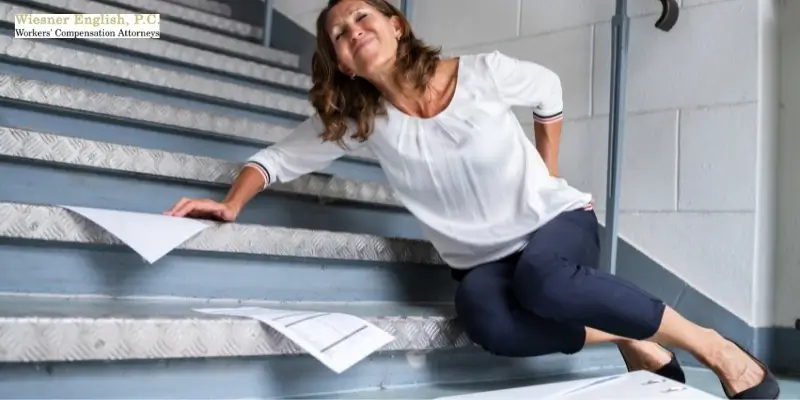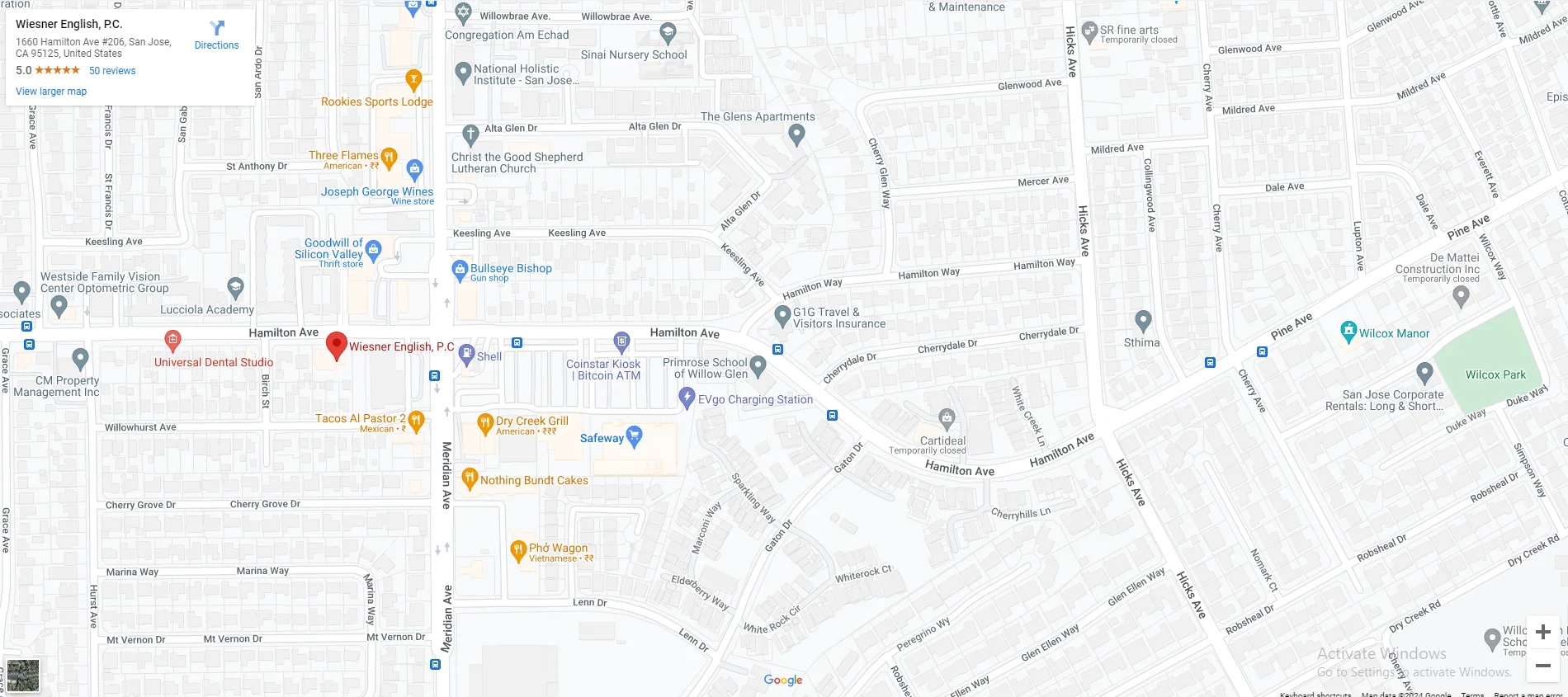Santa Clara Workplace Fall Lawyer

Santa Clara Workplace Fall Attorney
Fall accidents can come with serious and life-altering injuries. Whether it is tripping on cracked flooring, falling over boxes, pallets blocking pathways, or even tripping on electrical cords due to poor lighting, these injuries may have been caused by negligence. If you have been injured at work, reach out to a Santa Clara workplace fall lawyer.
What Causes Workplace Falls?
Some of the most common workplace injuries include falls. Sometimes, they are accidents, but other times, they stem from negligence, such as:
- Not cleaning spills or debris.
- Failing to repair or replace worn-out flooring or stairs.
- Allowing clutter or tripping hazards to accumulate in high-traffic areas.
- Not providing proper fall prevention training.
- Denying access to safety gear like non-slip footwear.
- Overloading ladders, scaffolds, and other equipment.
- Faulty or defective equipment.
- Other companies working on-site that are not addressing fall hazards.
Employees who are hurt from a fall at work are entitled to workers’ compensation.
Workers’ Compensation Benefits in California
Workers’ compensation benefits are available for employees who are hurt while on the job. These benefits are meant to help them recover and return to work. It should cover all medical costs and lost wages and provide temporary or permanent disability benefits.
Third-Party Fall Accident Damages
In addition to workers’ compensation, injured employees may also file a third-party liability claim against parties who are not the employer but who may have caused the injury. These third parties may be contractors, sub-contractors, manufacturers, employees from other companies, property owners, etc. A knowledgeable lawyer in Santa Clara can help you pinpoint which parties may be liable and determine if you have a claim.
Workers’ compensation claims will cover employees’ medical costs and lost wages, but a third-party personal injury accident can recover additional money for medical costs and lost wages, property damage, emotional distress, pain and suffering, and permanent injuries.
Workers’ Compensation vs. Personal Injury Compensation
The main differences when it comes to workers’ compensation and personal injury compensation are whether fault can be determined and what damages may be recovered. Unlike personal injury lawsuits, workers’ compensation claims operate under a no-fault system.
Negligence and Fault
To recover damages in a personal injury case like a workplace fall, you must prove negligence caused your injuries. On the other hand, workers’ compensation cases do not require fault. If an employee is injured on the job, they are entitled to those benefits. There is no need to prove that your employer or coworkers were negligent.
Pain and Suffering
Another difference when it comes to workers’ compensation claims and personal injury lawsuits is the damages that could be recovered. Employees are not entitled to receive pain and suffering damages in a workers’ comp case, but in a personal injury lawsuit, they can. They can also claim for other losses, such as loss of earning capacity, permanent injuries, ongoing medical expenses, and the loss of enjoyment of life. These damages are not obtained through workers’ comp.
California’s Statute of Limitations Fall Cases
The state has a statute of limitations when it comes to fall cases, meaning employees have a certain amount of time they must file a lawsuit or forfeit the option to do so. Generally, you have a two-year window from the date of the accident to file.
There are some exceptions to this rule. If the employee was under 18 years of age at the time, the statute of limitations begins on their 18th birthday. Another exception is if the injury was not discovered immediately. The two-year time frame begins at the date of discovery.
FAQs About Santa Clara, CA Workplace Fall Laws
How Long Do I Have to Sue for Work-Related Injuries in California?
Most cases of work-related injuries, including falls, need to be filed within two years from the date of the incident. There are a few exceptions, though. For example, if the injury is not discovered immediately, the statute of limitations is moved to one year from the date of discovery. If you were a minor at the time of the injury, the two-year time limit begins when you turn 18.
Can I Lose My Job Due to a Workplace Injury?
No, in California, you cannot be fired because you filed for a workers’ compensation claim. If an employer can demonstrate legitimate and non-retaliatory reasons to terminate you, it could be legal for them to do so. Also, if your work injury caused a permanent disability that prevents you from doing the essential functions of your job, your employer could terminate you.
What Types of Compensation Can I Receive for a Workplace Fall?
In California, you could be awarded compensation to cover your medical treatment costs, such as doctor visits, surgeries, physical therapy, or prescriptions. You could also receive temporary or permanent disability benefits and vocational rehabilitation services. If the workplace accident was fatal, certain dependents, like children and spouses, could receive financial support through death benefits.
Can I Sue a Third Party for my Workplace Fall?
Yes, you can sue a third party for a workplace fall in California. This means if a property owner, manufacturer, or even another contractor working at the site is found liable for the fall, you could file a separate lawsuit against them in addition to the workers’ compensation benefits from your employer.
What If I Was Partially at Fault for My Workplace Fall?
If you are found to be partially at fault for your workplace fall, you could still be awarded damages, but they will be reduced by your percentage of fault. This is due to California’s “pure” comparative negligence system. So, if you are found to be 30% responsible for the accident, your awarded damages would be reduced by that amount.
Unsure About Your Case? Reach Out to an Experienced Santa Clara Workplace Injury Lawyer
If you were injured in a workplace fall, you may be entitled to compensation. Discuss your case with a knowledgeable workplace injury lawyer at Wiesner English, P.C. Contact our office for a free consultation so we can discuss the details of your case and decide how to proceed.
Request A
Free Consultation
Fields marked with an * are required





